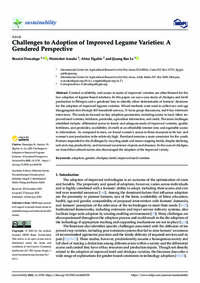Challenges to Adoption of Improved Legume Varieties: A Gendered Perspective

Authors:
Limited availability and access to seeds of improved varieties are often blamed for the low adoption of legume-based rotations. In this paper, we use a case study of chickpea and lentil production in Ethiopia and a gendered lens to identify other determinants of farmers’ decisions for the adoption of improved legume varieties. Mixed methods were used to collect sex and age disaggregated data through 360 household surveys, 11 focus group discussions, and 8 key informant interviews. The analysis focused on key adoption parameters, including access to land, labor, improved seed varieties, fertilizers, pesticides, agriculture information, and credit. The main challenges identified include: differential access to timely and adequate seeds of improved varieties, quality fertilizers, and pesticides; availability of credit at an affordable interest rate; and equitable access to information. As compared to men, we found women’s access to these resources to be low and women’s cost production to be relatively high. Farmland remains a main constraint for the youth. Farmers responded to the challenges by recycling seeds and mono-cropping lentils, despite declining soil and crop productivity, and increased occurrence of pests and diseases. In the case of chickpea, we found that cultural norms also discouraged the adoption of the improved variety.
